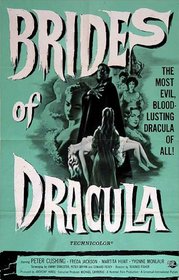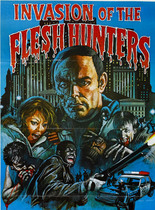Our editor-in-chief Nate Yapp is proud to have contributed to the new book Hidden Horror: A Celebration of 101 Underrated and Overlooked Fright Flicks, edited by Aaron Christensen. Another contributors include Anthony Timpone, B.J. Colangelo, Dave Alexander, Classic-Horror.com's own Robert C. Ring and John W. Bowen. Pick up a copy today from Amazon.com!
The Brides of Dracula (1960)
After the massive success of Horror of Dracula in 1958, Hammer Films was keen on making a sequel - even when Christopher Lee was not set to return to the role of Count Dracula. Nonetheless, filming began on a sequel that carried on without Dracula and surprisingly became one of the best sequels in the entire Hammer horror cannon. Ladies and gentlemen - I present Terence Fisher's The Brides of Dracula.
Taking place sometime after the events of the first film (and, hence, the death of Count Dracula), a narrator informs us that we are in Transylvania - still home to 'magic and devilry'. We join a young school teacher named Marianne (played by the gorgeous Yvonne Monlaur) en route to her new place of employment. She finds herself stranded at an inn along the way when her superstitious coachman, overcome with fear, leaves her unexpectedly just before sunset. After being invited to stay the night at the home of a local Baroness who hears of her plight, she ends up being coaxed into releasing the imprisoned Baron Meinster (David Peel) - an evil vampire disciple of Dracula himself who convinces her he is the victim of the Baroness' treachery and not the sick man she has made him out to be. Horrified and confused when his release sets off utter chaos within the castle, Marianne flees into the woods and soon falls unconscious there. The next morning, she is found by none other than Dr. Van Helsing (the outstanding Peter Cushing, reprising his role from the previous film), who offers to take her on to her school and takes great interest in her story. Having returned to the village after her safe arrival, he finds that there is indeed a vampire at work there and he quickly educates the locals and takes measures to stop the evil before it spreads. Eventually, the good doctor finds himself face to face with the evil Baron in a harrowing showdown at a decrepit old windmill.
Terence Fisher's direction is in top form, with breathtaking shots and set-pieces that words just can't do proper justice to. Certain interior and exterior shots of the Meinster estate (particularly those from Marianne's room down on the Baron below) show a sense of spatial reasoning and visual depth that not many filmmakers ever attempt, much less achieve. The exterior shots of the windmill in the film's climax are both iconic and awe-inspiring, mingling the decrepit mill itself with a staged foreground and a threatening night sky to great effect. In fact, the entire picture is filmed with the polished and dignified look of a gothically beautiful Hollywood classic, each frame and scene carrying a humble sense of utter greatness in a wonderfully British-Gothic style.
Peter Cushing plays the role of our hero Dr. Van Helsing, turning out such a fine performance that for most of the film you forget there is no Dracula here. His character is the epitome of noble goodness, a quick-witted and truly formidable force for righteousness. His delivery is sharp and intelligent, his demeanor mild but unbreakable. When he sees evidence of evil at hand, he does everything within his power to stop it without question and we, as the audience, do not question him. The Van Helsing character is almost always an important part of stories in which he appears, though he is often portrayed as a little stale and stiff. However, in the beyond capable hands of Cushing, Van Helsing seems fresh and exciting in a way that no other performer comes close to matching. I would have enjoyed a series of solo Van Helsing adventures lead by Cushing; it is a shame that he did not return to the role until many years later.
David Peel plays the heavy, the monstrously conniving Baron Meinster, with the evil glee of a demented child who suffers from a twisted personality disorder. When the moment calls for it, he is charming and vulnerable; at other times, he is vicious and remorseless, a truly terrible and manipulative force to be reckoned with. Though capable of great evil like his forebear, the Baron is something of a direct counterpoint to Christopher Lee's more brooding Count - instead of forcing his way in, he charms his way in to strike and serves as much as a twisted suitor of sorts to Marianne as he is a victimizer. Within the confines of the story, Peel's characterization works perfectly and serves as a memorable monstrous villain in classic film - a powerful, but slippery monster whose real threat is as human as it is supernatural.
The wily housemaid, Greta, is essayed by the hilariously over the top Freda Jackson with such zeal and energy that she actually manages to be funny and scary at the same time - something not many people can successfully pull off on both ends. The character herself is obviously a little cracked, having been put in the compromising situation of keeping a terrible secret while living in constant fear of it - only to see that terrible thing escape after so many years and become a fully realized threat to everything and everyone she knows. Given that, her portrayal is perfectly fitted to a character that is equal parts cold responsibility and wild, unwavering insanity. In the scene where she scolds Marianne for releasing the Baron, she carries out her serious words of bereavement with a constant chuckle that soon grows into outright hysterical laughter. The effect is again comical, but also quite chilling and adds flavor to the otherwise straight performances around her.
The other supporting players all handle their roles well, if not necessarily with excellence: as is the case with many of Hammer Film's leading ladies, Yvonne Monlaur is far more valuable as eye candy than for any true dramatic talent, but she does manage to hold things together until Van Helsing arrives to carry the weight of the story; Martita Hunt's Baroness carries the air of sinister nobility and devious intentions well, though she is nowhere near as captivating as our hero or villain. The rest of the cast is mere fodder to fill out the spaces around our leads, but as such there is no particular standout who really fails at their role or detracts from the overall picture. There is much to be said for mediocrity when it is in its proper place...
What is truly striking about this film is the superb script by the writing team of Peter Bryan, Edward Percy, the legendary Jimmy Sangster, and an uncredited Anthony Hinds. Successfully continuing the story of Dracula without the Count himself is quite a feat in itself, but that is only the tip of the proverbial iceberg. Within this story, we are treated to such creative nuances as Van Helsing's surprisingly painful (though ultimately successful) cure for a vampire bite and a never before seen way of dispatching the villain. The premise itself stems from family secrets and power plays amongst the rich and powerful that add an extra layer of dread to a film already full of atmosphere and horror. To take it a step further, one could even see more than a hint of dire social commentary in the basic concept of dark secrets within the powers that be leading to a town full of people who have simply become accustomed to living in fear - a bold political statement that has become even truer in more modern times. Alongside hints of a somewhat Oedipal relationship between the Baroness and her cursed son and the Baroness' story arc of falling from grace and ultimately choosing righteous redemption, there is much to be seen in this story beyond a simple, topical horror yarn - a true mark of definitive classic horror at its finest.
If you have not already seen Brides of Dracula, you are doing yourself an immeasurable disservice as a horror fan and should immediately rectify such a horrendous oversight. This film is loaded with everything that makes a classic film truly classic - from some terrificly iconic performances and characterizations to a story that works on multiple levels as few films can. This is a crowning achievement in the stellar careers of Fisher and Cushing, and even Hammer as a whole that is sure to satisfy even after repeated viewings - from the creepy opening narrative to the awe-inspiring climax, Brides of Dracula simply delivers and can not be overlooked.









A beautifully-wrtten review
A beautifully-wrtten review of a beautifully-done movie.
1960 was quite a year for classics:
PSYCHO
BLACK SUNDAY
FALL OF THE HOUSE OF USHER
BLOOD AND ROSES
And many more...
ALL released in 1960.
But, then there's 1968 !
Carl D.
I love this film, it is my
I love this film, it is my favorite movie! Ravishing to look at, great cast, wonderful atmosphere.... superb!
" I would have enjoyed a series of solo Van Helsing adventures lead by Cushing; it is a shame that he did not return to the role until many years later." Me too!
"What is truly striking about this film is the superb script by the writing team of Peter Bryan, Edward Percy, the legendary Jimmy Sangster, and an uncredited Anthony Hinds. " Agreed!